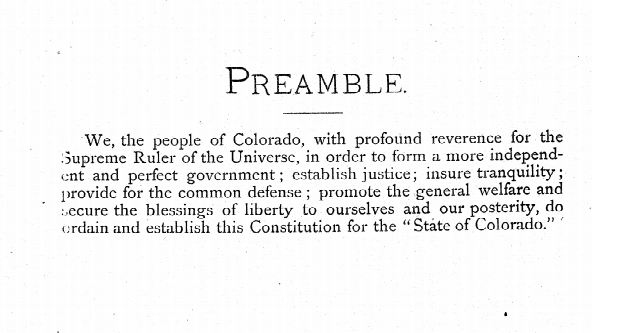Coloradans have opted to keep slavery in our constitution by 17,000 votes.
Proponents of Amendment T are "holding out hope" that provisional ballots might yet shrink that margin to 10,000 votes and allow for a recount, said Will Dickerson of Together Colorado, but they're also preparing for the most likely outcome, which is that the measure lost -- and lost despite unanimous support from Democratic and Republican legislators and no organized opposition.
Dickerson believes the confusing language of the amendment was a major problem.
Just a reminder, this is what was on our ballots:
“Shall there be an amendment to the Colorado constitution concerning the removal of the exception to the prohibition of slavery and involuntary servitude when used as punishment for persons duly convicted of a crime?”
Amendment T would have taken this part of the state constitution -- There shall never be in this state either slavery or involuntary servitude except as a punishment for crime, whereof the party shall have been duly convicted -- and gotten rid of the last clause: "except as a punishment for a crime ..."
But that "removal of the exception" language in the ballot measure functions almost like a double negative. Some voters may have believed a "no" vote would remove slavery, when what was needed was a "yes" vote.
Roughly 100,000 people who cast ballots this year didn't vote at all on Amendment T, a likely indication that they didn't understand the amendment.
The other problem, Dickerson said, was that the blue book included an argument against the amendment, despite the lack of any organized opposition. That's a requirement in Colorado. In the case of Amendment T, those arguments suggested there would be legal challenges to community service and prison work programs if slavery were prohibited as a punishment for crimes.
However, that hasn't been the case in numerous other states that ban slavery entirely, and neither district attorneys nor public defenders opposed Amendment T.
Dickerson said proponents will try again to remove slavery from the constitution in 2018.
What lessons will they draw from 2016?
"It's twofold for me," Dickerson said. "In order to run something as simple as taking slavery out of the constitution, there needs to be a lot of money going even into education. The way our system is set up, the way we write this language, is exclusive of the vast majority of people who walk around our streets.
"One of the bigger lessons is around the blue book," he continued. "There always has to be an opposing view even if nobody is opposing it. It definitely impacted this particular ballot."
In 2018, proponents will have "a very clear campaign, a very clear message," and they'll start raising money early, Dickerson said.
Some voters may have intentionally wanted to keep slavery for people convicted of crimes. For those voters, "it is situated in people's ideology around criminality and punishment and what that means," Dickerson said.
But he doesn't believe that's the majority.
"The vast majority of this, I don't blame on our people," he said. "I blame it on the rules we have set up."













